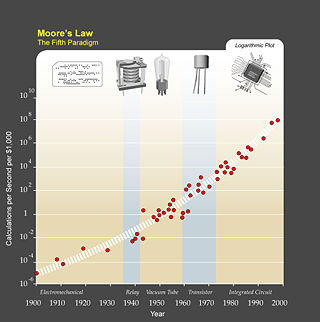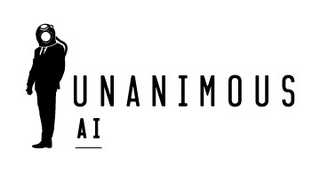
Raymond Kurzweil is an American computer scientist, author, entrepreneur, futurist, and inventor. He is involved in fields such as optical character recognition (OCR), text-to-speech synthesis, speech recognition technology and electronic keyboard instruments. He has written books on health technology, artificial intelligence (AI), transhumanism, the technological singularity, and futurism. Kurzweil is a public advocate for the futurist and transhumanist movements and gives public talks to share his optimistic outlook on life extension technologies and the future of nanotechnology, robotics, and biotechnology.

The future is the time after the past and present. Its arrival is considered inevitable due to the existence of time and the laws of physics. Due to the apparent nature of reality and the unavoidability of the future, everything that currently exists and will exist can be categorized as either permanent, meaning that it will exist forever, or temporary, meaning that it will end. In the Occidental view, which uses a linear conception of time, the future is the portion of the projected timeline that is anticipated to occur. In special relativity, the future is considered absolute future, or the future light cone.

Max Erik Tegmark is a Swedish-American physicist, machine learning researcher and author. He is best known for his book Life 3.0 about what the world might look like as artificial intelligence continues to improve. Tegmark is a professor at the Massachusetts Institute of Technology and the president of the Future of Life Institute.

A prediction or forecast is a statement about a future event or about future data. Predictions are often, but not always, based upon experience or knowledge of forecasters. There is no universal agreement about the exact difference between "prediction" and "estimation"; different authors and disciplines ascribe different connotations.
Forecasting is the process of making predictions based on past and present data. Later these can be compared with what actually happens. For example, a company might estimate their revenue in the next year, then compare it against the actual results creating a variance actual analysis. Prediction is a similar but more general term. Forecasting might refer to specific formal statistical methods employing time series, cross-sectional or longitudinal data, or alternatively to less formal judgmental methods or the process of prediction and assessment of its accuracy. Usage can vary between areas of application: for example, in hydrology the terms "forecast" and "forecasting" are sometimes reserved for estimates of values at certain specific future times, while the term "prediction" is used for more general estimates, such as the number of times floods will occur over a long period.

The National Weather Service (NWS) is an agency of the United States federal government that is tasked with providing weather forecasts, warnings of hazardous weather, and other weather-related products to organizations and the public for the purposes of protection, safety, and general information. It is a part of the National Oceanic and Atmospheric Administration (NOAA) branch of the Department of Commerce, and is headquartered in Silver Spring, Maryland, within the Washington metropolitan area. The agency was known as the United States Weather Bureau from 1891 until it adopted its current name in 1970.
Prediction markets, also known as betting markets, information markets, decision markets, idea futures or event derivatives, are open markets that enable the prediction of specific outcomes using financial incentives. They are exchange-traded markets established for trading bets in the outcome of various events. The market prices can indicate what the crowd thinks the probability of the event is. A typical prediction market contract is set up to trade between 0 and 100%. The most common form of a prediction market is a binary option market, which will expire at the price of 0 or 100%. Prediction markets can be thought of as belonging to the more general concept of crowdsourcing which is specially designed to aggregate information on particular topics of interest. The main purposes of prediction markets are eliciting aggregating beliefs over an unknown future outcome. Traders with different beliefs trade on contracts whose payoffs are related to the unknown future outcome and the market prices of the contracts are considered as the aggregated belief.

AccuWeather is a private-sector American media company that provides commercial weather forecasting services. AccuWeather was founded in 1962 by Joel N. Myers, then a Pennsylvania State University graduate student working on a master's degree in meteorology. His first customer was a gas company in Pennsylvania. While running his company, Myers also worked as a member of Penn State's meteorology faculty. The company adopted the name 'AccuWeather' in 1971.

Futures studies, futures research, futurism research, futurism, or futurology is the systematic, interdisciplinary and holistic study of social/technological advancement, and other environmental trends; often for the purpose of exploring how people will live and work in the future. Predictive techniques, such as forecasting, can be applied, but contemporary futures studies scholars emphasize the importance of systematically exploring alternatives. In general, it can be considered as a branch of the social sciences and an extension to the field of history. Futures studies seeks to understand what is likely to continue and what could plausibly change. Part of the discipline thus seeks a systematic and pattern-based understanding of past and present, and to explore the possibility of future events and trends.
Effective altruism (EA) is a 21st-century philosophical and social movement that advocates impartially calculating benefits and prioritizing causes to provide the greatest good. It is motivated by "using evidence and reason to figure out how to benefit others as much as possible, and taking action on that basis". People who pursue the goals of effective altruism, who are sometimes called effective altruists, follow a variety of approaches proposed by the movement, such as donating to selected charities and choosing careers with the aim of maximizing positive impact. The movement has achieved significant popularity outside of academia, spurring the creation of university-based institutes, research centers, advisory organizations and charities, which, collectively, have donated several hundreds of millions of dollars.
Earning to give involves deliberately pursuing a high-earning career for the purpose of donating a significant portion of earned income, typically because of a desire to do effective altruism. Advocates of earning to give contend that maximizing the amount one can donate to charity is an important consideration for individuals when deciding what career to pursue.

William David MacAskill is a Scottish philosopher and author, as well as one of the originators of the effective altruism movement. He was a Research Fellow at the Global Priorities Institute at the University of Oxford, co-founded Giving What We Can, the Centre for Effective Altruism and 80,000 Hours, and is the author of Doing Good Better (2015) and What We Owe the Future (2022), and the co-author of Moral Uncertainty (2020).

Augur is a decentralized prediction market platform built on the Ethereum blockchain. Augur is developed by Forecast Foundation, which was founded in 2014 by Jack Peterson, Joey Krug, and Jeremy Gardner. Forecast Foundation is advised by Ron Bernstein, founder of now-defunct company Intrade, and Ethereum founder Vitalik Buterin.

Unanimous AI is an American technology company provides artificial swarm intelligence (ASI) technology. Unanimous AI provides a "human swarming" platform "swarm.ai" that allows distributed groups of users to collectively predict answers to questions. This process has resulted in successful predictions of major events such as the Kentucky Derby, the Oscars, the Stanley Cup, Presidential Elections, and the World Series.
A superforecaster is a person who makes forecasts that can be shown by statistical means to have been consistently more accurate than the general public or experts. Superforecasters sometimes use modern analytical and statistical methodologies to augment estimates of base rates of events; research finds that such forecasters are typically more accurate than experts in the field who do not use analytical and statistical techniques, though this has been overstated in some sources. The term "superforecaster" is a trademark of Good Judgment Inc.

Samuel Benjamin Bankman-Fried, commonly known as SBF, is an American entrepreneur who was convicted of fraud and related crimes in November 2023. Bankman-Fried founded the FTX cryptocurrency exchange and was celebrated as a "poster boy" for crypto, with FTX having a global reach with more than 130 international affiliates. At the peak of his net worth, he was ranked the 41st-richest American in the Forbes 400.
FTX Trading Ltd., commonly known as FTX, is a bankrupt company that formerly operated a cryptocurrency exchange and crypto hedge fund. The exchange was founded in 2019 by Sam Bankman-Fried and Gary Wang and collapsed in 2022 after massive fraud perpetrated by Bankman-Fried and his partner Caroline Ellison forced the company to file for Chapter 11 bankruptcy.
Caroline Ellison is an American business executive who was convicted of fraud in 2023 in relation to the bankruptcy of FTX. She was the CEO of Alameda Research, a trading firm affiliated with the FTX and founded by Sam Bankman-Fried. Ellison was terminated from her position after FTX and Alameda filed for bankruptcy. In 2022, Ellison pleaded guilty to two counts of wire fraud, two counts of conspiracy to commit wire fraud, conspiracy to commit securities fraud and conspiracy to commit money laundering.
The bankruptcy of FTX, a Bahamas-based cryptocurrency exchange, began in November 2022. The collapse of FTX, caused by a spike in customer withdrawals that exposed an $8 billion hole in FTX's accounts, served as the impetus for its bankruptcy. Prior to its collapse, FTX was the third-largest cryptocurrency exchange by volume and had over one million users.

Manifold, formerly known as Manifold Markets, is an online prediction market platform. Users engage in competitive forecasting using play money called 'mana', as well as 'Sweepcash,' which can be withdrawn for real money, or donated to charity. Topics on Manifold have included the 2024 United States presidential election and the Oscars. Sweepstakes are US only and 18+. All states are eligible except Washington, Michigan, Idaho, and Delaware.












